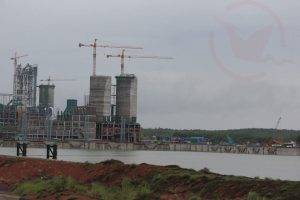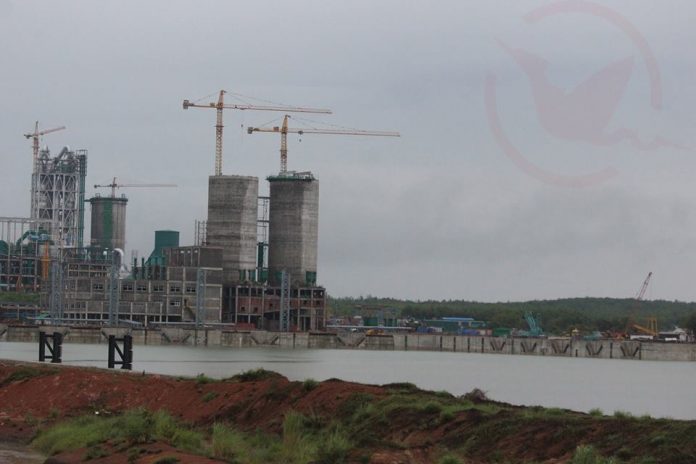According to a local news agency, a public consultation on the Environmental Impact Assessment (EIA) and Social Impact Assessment (SIA) reports on Mawlamyine Cement Limited’s (MCL) coal powered cement factory in Kyaikmayaw Township has been held at the Rehmonnya Hotel in Mawlamyine on August 17th and the Chief Minister of Mon State, Dr. Aye Zan, has joined the event.
In order to understand the current impacts of MCL’s cement factory, the Human Rights Foundation of Monland (HURFOM) has interviewed two local residents about the environmental consequences of the coal-fired power plant run by MCL in Kyaikmayaw Township.
Nai D—, male, 43 years old, Kwan Ngai village, Kyaikmayaw Township.
“As the MCL’s [cement] factory began operating [in our area], the ships [are using the Attran River] for transportation so that the local fishermen can’t do fishing. This is the first impact.
Next, in Kwan Ngai, we have made water pools to store drinking water. We use the river water for taking a bath. Now no one dares to drink the water from the pools because the villagers are afraid that something bad from the MCL’s factory has contaminated the water. So they have to buy drinking water. There is a huge challenge regarding drinkable water. Not only in our Kwan Ngai [village], other surrounding villages have to dig wells in order to have access to drinking water. They are afraid of the ash and bad smells from the MCL’s factory and they do not dare to use the water from the pool.

All of the villages in this region have water resource problems because of the factory. We’re afraid that some chemicals have contaminated the water, but we don’t know exactly which kind of chemicals have contaminated it. We have seen that particles and ash blow from the factory and have dissolved in the pool, so we dare not drink the water. We want to do a laboratory test. If we can have access to chemists, we want them to do a laboratory test on our water resources.”
Nai M—, male, 54 years old, Kwan Ngai village, Kyaikmayaw Township.
“The problem regarding water resources started five months ago. We’ve never heard that someone had to buy drinking water in our village before, but now we have to see what we’ve never experienced before. We’re unhappy about what we have to experience.
We see the smoke emitted by the factory floating in the sky. When it rains, we’re afraid that the smoke will dissolve in the rainwater and enter into our water pool. We also see the ashes [emitted by the factory] with our naked eyes. But only experts will know the consequences [of those by-products]. The news and experts tell us about the impacts of coal, so we dare not use the water in the pools.
We know that chemicals must be produced from burning coal. But we don’t know how much of those chemicals are harmful to us. We don’t want to live amongst smoke and ashes, so we want the authorities to do something to protect us.
One more thing is that they are doing explosions at Pyar Taung Mountain. We dare not do farming near the mountain, as we’re afraid of small stones from the project hitting us. The Pyar Taung Mountain is where we can access vegetables and meat. But there are no more wild animals on the mountain. As the mountain has been destroyed, there are no more vegetables there either. We have lost our traditional livelihoods. We want to say that Dr Min Kyi Win, the Minister of the Mon State Ministry of Natural Resources and Environmental Conservation, knows the situation and has a sympathy for us.”
This story is published by Human Rights Foundation of Monland (HURFOM)

